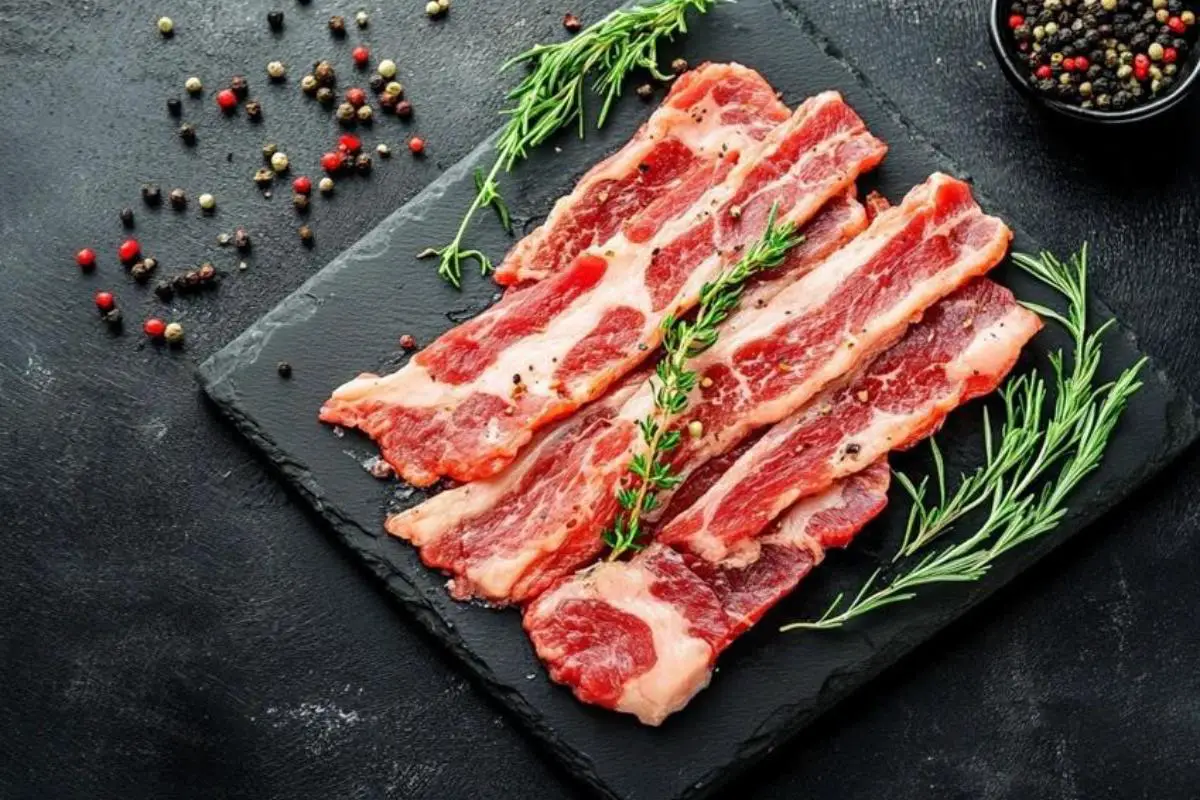Beef bacon has become a popular alternative to the more traditional pork bacon. People choose it for several reasons, such as dietary restrictions or preferences for a leaner meat option. But the real question is: Is beef bacon healthy? In this article, we explore its nutritional value, health benefits, and the risks of consuming beef bacon. By the end, you’ll know if this bacon alternative is right for your diet.
What is Beef Bacon?
Unlike pork bacon, beef bacon comes from cows, usually from the belly or other fatty cuts. It goes through the same process as pork bacon: curing and smoking. However, beef bacon has a distinct flavor and a different nutrient profile. People who follow religious diets like halal or kosher often prefer beef bacon. Additionally, health-conscious eaters turn to beef bacon for its leaner fat content compared to pork.
Why is Beef Bacon Gaining Popularity?
Many choose beef bacon because it offers a high-protein, low-fat alternative. Its growing popularity also stems from dietary trends like the keto and paleo diets. These diets focus on high-protein foods and sometimes exclude pork. But, does this make beef bacon a better choice? Let’s dig into its nutritional value to find out.
Nutritional Overview of Beef Bacon

Beef bacon provides a different nutritional profile than pork bacon. It typically contains:
- More protein than pork bacon
- Less fat overall, especially in leaner or grass-fed varieties
- Higher amounts of iron and vitamin B12, both of which are essential for energy and metabolism
- Sometimes fewer calories, depending on the type of beef used
Grass-fed beef bacon is often 90% lean, making it a low-fat option. To compare how beef bacon stacks up nutritionally against pork bacon, check out this detailed comparison from The Kitchn.
Although beef bacon may have less fat, it’s still a processed meat with high sodium. Consuming too much sodium can lead to high blood pressure and heart disease. For more on how processed meats affect heart health, read this informative article from Healthline.
Protein and Iron
Beef bacon delivers more protein per serving compared to pork bacon. It’s also a good source of iron, a mineral that helps keep your blood healthy. If you need more iron and B vitamins in your diet, beef bacon might be a smart choice.
Is Beef Bacon Healthier Than Pork Bacon?
To answer this, let’s break it down:
- Fat and Calories: Beef bacon generally has less fat and fewer calories than pork bacon, especially in leaner cuts. This makes it appealing for people trying to lower their fat intake while still enjoying bacon.
- Cholesterol: With less saturated fat, beef bacon has a smaller impact on cholesterol levels. Lower cholesterol can reduce the risk of heart disease.
- Protein: Beef bacon offers more protein per serving, which is beneficial for muscle building and recovery.
Even though beef bacon may seem like a healthier choice, it’s still a processed meat. To minimize risks, opt for nitrate-free and uncured options. These reduce the potential for harmful preservatives.
Health Benefits of Beef Bacon
Beef bacon has several benefits, particularly if eaten in moderation:
- High Protein Content: Beef bacon is rich in protein, helping with muscle repair and daily bodily functions.
- Rich in Iron and B12: Beef bacon is a good source of iron and vitamin B12, essential for maintaining energy levels and healthy red blood cells.
- Less Saturated Fat: Compared to pork bacon, beef bacon contains less saturated fat, especially in leaner cuts.
- Low-Carb Friendly: If you’re following a low-carb or keto diet, beef bacon fits perfectly. It’s high in protein and contains no carbs.
Lean and Grass-Fed Varieties
Grass-fed beef bacon also has higher levels of omega-3 fatty acids, which can benefit your heart and brain health. Opt for grass-fed varieties when possible to get the most out of your beef bacon.
Potential Health Risks of Beef Bacon
While beef bacon has benefits, there are risks if consumed in large quantities. Key risks include:
- Saturated Fat: Although beef bacon contains less fat than pork, it still has saturated fat. Eating too much saturated fat can lead to higher cholesterol levels, increasing the risk of heart disease.
- Sodium: Like other cured meats, beef bacon is high in sodium. High sodium intake can lead to high blood pressure, which increases the risk of stroke and heart disease.
- Processed Meat Risks: Beef bacon is a processed meat, and processed meats can contain nitrates and nitrites. These preservatives are linked to certain cancers when consumed in large amounts. To minimize this risk, choose nitrate-free beef bacon.
Comparing Beef Bacon with Other Alternatives

Beef bacon isn’t the only alternative to pork bacon. Let’s compare it with a few others:
Beef Bacon vs. Pork Bacon
Beef bacon is leaner than pork bacon, making it a better choice for those looking to reduce fat intake. It also has more protein. However, both contain sodium
and can be considered processed meats. The key difference is that beef bacon usually contains less saturated fat and cholesterol than pork bacon, which may make it a healthier option for those concerned about heart health. However, both should be eaten in moderation due to their sodium content.
Beef Bacon vs. Turkey Bacon
Turkey bacon is often seen as a leaner alternative to both beef and pork bacon. It has even less fat and fewer calories than beef bacon, making it popular among people trying to reduce calorie intake. However, turkey bacon is also lower in protein and may contain more additives to enhance flavor and texture, which some consumers try to avoid.
- Fat Content: Turkey bacon has the least fat of the three options, making it appealing for low-fat diets.
- Protein: Beef bacon contains more protein, which is ideal for those focused on maintaining or building muscle mass.
Beef Bacon vs. Plant-Based Bacon
For those avoiding meat altogether, plant-based bacon offers a cholesterol-free and lower-fat alternative. These versions are made from ingredients like soy or peas. However, plant-based bacon often contains added fillers and preservatives to mimic the taste and texture of traditional bacon. It also lacks the high protein content that beef bacon provides.
- Health Benefits: Plant-based bacon has no cholesterol and significantly less fat, making it suitable for vegans or those trying to cut down on fat intake.
- Protein: Plant-based bacon typically contains less protein than meat-based bacon, so it may not be as fulfilling for those looking for a high-protein alternative.
How to Incorporate Beef Bacon into a Balanced Diet
To include beef bacon in a healthy diet, moderation is key. Here are some tips for incorporating beef bacon without overindulging:
- Portion Control: Limit beef bacon to 2-3 slices per serving. This allows you to enjoy the flavor without consuming too much fat or sodium.
- Healthy Pairings: Combine beef bacon with vegetables, whole grains, and lean proteins. For example, you can add it to a spinach salad or as a topping for a whole-grain sandwich to balance the nutrients in your meal.
- Cooking Methods: Bake or grill beef bacon rather than frying it. Baking or grilling requires less added fat, allowing the bacon to crisp up while maintaining its flavor.
- Choose Nitrate-Free Varieties: Whenever possible, select nitrate-free or uncured beef bacon to avoid unnecessary preservatives.
Is Beef Bacon Suitable for Special Diets?
Beef bacon is a versatile option that can fit into various diets:
- Low-Carb/Keto: Since beef bacon is high in protein and contains almost no carbohydrates, it is ideal for low-carb and keto diets. Its protein content helps keep you full without adding carbs to your meal plan.
- Paleo: For those following a paleo diet, beef bacon fits well, especially if it’s from grass-fed sources. Paleo enthusiasts often prefer natural, whole foods with high protein and low processing.
- Gluten-Free: Beef bacon is naturally gluten-free, making it suitable for individuals with gluten sensitivities or celiac disease. However, always check labels for added ingredients that could contain gluten.
- Halal and Kosher: Beef bacon is also available in halal and kosher varieties, making it a safe choice for individuals with religious dietary restrictions.
Expert Opinions on Beef Bacon
Health experts suggest that while beef bacon offers some benefits over pork bacon, it should still be eaten in moderation. Here’s what dietitians and health professionals say:
- Dietitians’ Take: Many dietitians agree that beef bacon provides a leaner alternative to pork bacon. However, they caution against eating large amounts due to the high sodium content. They recommend pairing it with fresh vegetables and other whole foods to ensure a balanced diet.
- Processed Meat Warnings: Health organizations, such as the World Health Organization (WHO), classify processed meats like bacon as carcinogenic when consumed in high quantities. This means that while beef bacon may offer nutritional benefits, moderation is essential.

FAQs: Is Beef Bacon Healthy?
Here are some frequently asked questions about beef bacon:
- What is beef bacon made of?
Beef bacon comes from the belly or other fatty cuts of beef. It is typically cured and smoked, similar to pork bacon. - Is beef bacon healthier than pork bacon?
Beef bacon generally contains less fat and more protein than pork bacon, making it a leaner option. However, both are processed meats and should be eaten in moderation. - Can you eat beef bacon on a keto diet?
Yes! Beef bacon is a perfect fit for keto diets due to its high protein and low carb content. - Does beef bacon have less sodium than pork bacon?
Not necessarily. Both types of bacon can be high in sodium due to the curing process. Look for low-sodium or nitrate-free varieties to reduce sodium intake. - Is beef bacon processed meat?
Yes, beef bacon is a processed meat. It often contains preservatives like nitrates and nitrites tolife and enhance flavor. Choosing uncured or nitrate-free options can reduce the risks associated with these preservatives.
- Is beef bacon halal or kosher?
Yes, beef bacon can be found in both halal and kosher varieties, making it suitable for people following religious dietary restrictions. - How many calories are in beef bacon compared to pork bacon?
Beef bacon tends to have fewer calories than pork bacon, especially in lean or grass-fed varieties. On average, beef bacon contains about 30-40 calories per slice, while pork bacon may contain 40-70 calories per slice, depending on the cut. - Is grass-fed beef bacon healthier than grain-fed?
Yes, grass-fed beef bacon is often considered healthier because it contains more omega-3 fatty acids and less saturated fat. Grass-fed beef tends to be leaner and has a better overall nutrient profile.
Conclusion
Beef bacon is a healthier alternative to traditional pork bacon in several ways. It provides more protein and less fat, especially in leaner or grass-fed varieties. Additionally, it’s rich in iron and vitamin B12, making it a good choice for those seeking to boost their intake of these essential nutrients. However, like all processed meats, beef bacon should be eaten in moderation due to its sodium content and the potential health risks associated with processed foods.
To enjoy beef bacon in a healthy way, consider pairing it with fresh vegetables, whole grains, and other nutrient-rich foods. Opt for nitrate-free or uncured varieties to reduce exposure to harmful preservatives. Beef bacon can fit into a variety of diets, from keto to paleo, and is available in halal and kosher versions for those with dietary restrictions.
By making smart choices, such as selecting grass-fed beef bacon and moderating portion sizes, you can enjoy the flavor and nutrition of beef bacon without the drawbacks associated with its pork counterpart.
- Is beef bacon halal or kosher?

